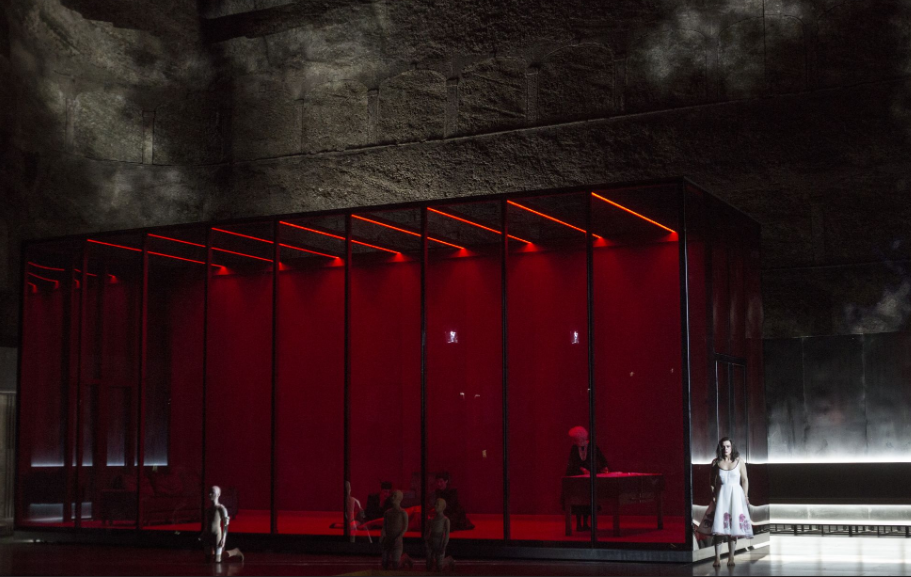Salome – Strauss – Bayerische Staatsoper Munich
Image taken from the Bayerische Staatsoper website
Based on Oscar Wilde’s original French play Salome, Strauss composed this opera to a German libretto and whilst there is indeed a 1907 French version, it is this German version that is performed so widely today.
The opera was first performed in Dresden in 1905. It was in fact banned in England and was not given its premiere until 1910 under the Beecham baton at Covent Garden.
For this performance Munich were fortunate to have the music conducted by the outstanding Kirill Petrenko with the direction controlled by Krzysztof Warlikowski.
The action takes place in the middle of the Second World War, with the production opening in the living room/library of a prominent Jewish family - Herodes, his wife Herodias and daughter Salome, together with their guests. It was a frightening opening scene played to some bars of the music of Mahler’s Kindertotenlieder. The guests were arguing religion and with the Nazi’s close they were waiting inevitably for their ultimate fate in a Frankesque state – without the loft!
The stage at this beautiful 2,100 seater Munich Opera House is wide and perhaps in order to provide some real intimacy – sorely lacking - Warlikowski splits the stage, not only for Jochanaan’s entrance, but also for Salome’s Dance of the Seven Veils.
Death is also a centre point of the evening’s production and it shows throughout, but particularly towards the end of the opera with Jochanaan’s death scene. Salome’s dance scene is rather beautifully portrayed with a Doctor Death ballet dancer, but it is Salome’s demand for Jochanaan’s head when the production takes a rather awkward twist in a self-satisfied interpretation by the Director. Ultimately of course Herodes grants Salome’s request, delivering Jochanaan’s head in a box. But did he! In this production Jochanaan remains alive to the end and it is indeed the Jewish guests of Herodes who all die by taking poison supplied by the previously dead Narraboth – he of course having died earlier in the opera out of love for Salome. Warlikowski’s interpretation at this stage rather loses the plot and Salome’s final lengthy aria and her cavorting with what was meant to be Jochanaan’s head, with her desire to kiss his lips, in fact turns out to be nothing but a play with an empty box.
Salome was sung by the Scandinavian soprano, Marlis Petersen. Whilst she doesn’t possess the vocal heft for this role – she has more of a lyric soprano – her interpretation leaves little to the imagination and was more powerful than even the outstanding 2008 performance by Angela Denoke. Her Jochanaan was the clear and precise baritone of Wolfgang Koch. The Herodes and Herodias were both substantially sung by Wolfgang Ablinger-Sperrhacke and Michaela Schuster. The Narraboth, who produced incredible chemistry with Salome at the beginning, was Pavol Breslik and Herodias’s Page was an ample voiced Rachel Wilson. All the Jews and Nazarenes sang well.
But if the Warlikowski production disappointed at times, it was the outstanding conducting of the Music Director Kirill Petrenko that stole the show. If Nagano’s conducting in 2008 was at the top of its game, Petrenko matched him and more. He drew every ounce of sound from the outstanding Bayerische Staatsorchester.
And so, the failings in the production or in the vocal prowess of Salome were in the end slight compared to the overall musical power of the evening and the audience themselves departed feeling utterly drained.







